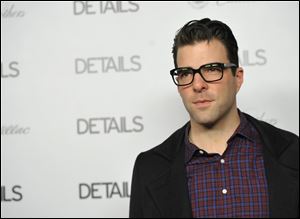
Zachary Quinto dishes on American Horror Story: Asylum
Villain role not completely foreign to actor
12/3/2012
Zachary Quinto has played the villain before, most famously as Sylar on NBC's Heroes. But in FX's American Horror Story: Asylum, he got a chance to establish his character, Dr. Oliver Thredson, as a good guy — or, at least, as a sane guy among patients and their abusive keepers in an insane asylum — before pulling the rug out from under viewers' expectations.
Zachary Quinto has played the villain before, most famously as Sylar on NBC's Heroes.
But in FX's American Horror Story: Asylum, he got a chance to establish his character, Dr. Oliver Thredson, as a good guy — or, at least, as a sane guy among patients and their abusive keepers in an insane asylum — before pulling the rug out from under viewers' expectations.
In the Nov. 14 episode, Thredson was revealed to be Bloody Face, a serial killer of women whose crimes authorities attribute to new Briarcliff Manor resident Kit Walker (Evan Peters).
Quinto appeared in the first season of American Horror Story as a different character. So did his co-stars, Jessica Lange and Peters. (AHS was renewed earlier this month for a third season, but so far Lange is the only actor attached to return as yet another different character.)
Quinto, who is probably best-known for re-creating the role of Spock in J.J. Abrams' Star Trek reboot — the sequel, Star Trek: Into Darkness, will be in theaters May 17 — said he knew from the beginning about Thredson's true nature.
"It was part of the conversation that I had with [executive producer] Ryan [Murphy] about me coming back to the second installment of the show," Quinto said in a recent teleconference with reporters. "I felt like my responsibility became to create a character that people could trust, or at least trust initially, and have some hope that perhaps he is actually the one voice of reason and sanity within this chaotic world. So it was actually more exciting for me to know from the beginning. It gave me more to play with and more to hold back and more secrets to keep."
Quinto said that opportunity to build up the character in one direction before the reveal set this particular role apart from past villains he's played.
"Any time an actor revisits territory that they've been in before, it can be a source of trepidation, as it was for me," Quinto said. "But part of the reason that I loved what the opportunity stood for was that I got to know, going in, I got to really build something. With Heroes, that character was built before I was ever attached to it. There were eight episodes of anticipation that were built before you met Gabriel Gray in Heroes, but I had no participation in that.
"For me, it was really exciting to get to go in and having all the information, and actually be that part of the process of creating a character," he said. "That, to me, was a difference. That, to me, was something that I thought, 'Yes, that makes sense,' and it also has a similar structure to the journey that I had on Heroes, at least the introduction or the reveal, as they say, which proved very effective in that scenario, and I felt I could really also serve this story in this particular innovation as well."
Quinto said he liked that his Thredson character is more grounded — no superpowers — than Sylar/Gabriel Gray on Heroes and that AHS offers actors an opportunity to play a role for a limited period of time. On most TV shows, actors sign multiyear contracts that lock them in. But because AHS tells a different story in each 13-episode season, actors just have to commit to a role for a few months of filming.
"It's attractive in a different way for somebody that's used to doing features and used to having more flexibility with their schedules," Quinto said.
A subsequent episode, The Origins of Monstrosity, delved into the roots of the characters in Asylum.